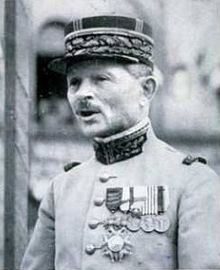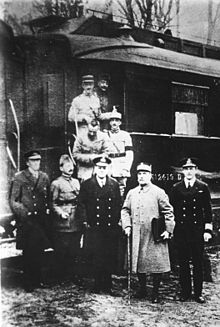Maxime Weygand
Maxime Weygand [ vɛ'ɡɑ̃ ] (born January 21, 1867 in Brussels , † January 28, 1965 in Paris ) was a French general in the First and Second World Wars . He can be assigned to the political right .
Life
Parentage and childhood
Weygand's actual ancestry has not yet been established. He himself always stated that she was unknown to him. Rumor has it that he was an illegitimate son of the Empress Charlotte of Belgium . However, it was never possible to find out more about this. But it is also suspected that he could have been an illegitimate son of the Belgian King Leopold II , Charlotte's brother.
He spent his childhood up to the age of six in Marseille in the care of a widow named Virginie Saget. David Cohen de Léon, a financier of Sephardic origin who was friends with Leopold II , later became his foster father .
Career
In 1885 Weygand entered the Saint-Cyr military school under the pseudonym de Nimal, the name of Cohen de Léon's partner . In 1887 he passed his diploma, the cavalry came in and, after training in Saumur to 4 e régiment de dragons added. When he was twenty years old, his guardian's accountant, François-Joseph Weygand, adopted him, which gave him French citizenship .
In 1900 he married Renée Weygand (nee de Forsanz). In the pre-war period he turned down several opportunities to complete general staff training, each on the grounds that proximity to the troops was more important to him. After his appointment as Lieutenant-Colonel , he was placed at the military college because of his achievements and made Knight of the Legion of Honor in 1913 .
One month after the beginning of the First World War , he was appointed to the staff of Marshal Ferdinand Foch with the rank of colonel and rose to major general until the end of the war. As a close advisor to Foch, he was also present at the armistice negotiations with the German Empire in November 1918 .
In 1920 Weygand was Général de corps d'armée and sent as a French military advisor to the Polish army in the Polish-Soviet war . However, his share in the victory of the Poles under Marshal Józef Piłsudski was, according to his own statement, equal to zero, since Weygand had only arrived in Poland after the decisive battle of Warsaw . There was no use for a French general staff member because of the talents of their own military commanders; the resurrected Poland hoped primarily for material help from France. Nevertheless, he was celebrated as a national hero on his return to his home country.
Weygand acted from 1923 as commander of the French armed forces in the Levant and as high commissioner of Syria and Lebanon . In the course of this, he was promoted to Général d'armée and took over the office of High Commissioner from General Henri Gouraud . In 1925 he was awarded the Estonian Freedom Cross. When he returned to France, he took up posts on the Supreme War Council and at the head of the military college. In 1931 he was elected to the Académie française at the same time as Pierre Benoit , where he replaced Foch. Until his retirement in 1935 and beyond, he wrote several works on French military history.
Second World War
Weygand was not indifferent to the technological innovations on the battlefield like his later political companion Marshal Henri Philippe Pétain , but he was not one of their pioneers. The Blitzkrieg strategy of the Wehrmacht, which was alien to him, led him to a number of wrong decisions in the later stages.
In a state of tension before the start of the war, the general was called back from retirement in 1939 by Prime Minister Édouard Daladier . He was given command of French forces in the Middle East. At the same time he was responsible for coordinating the armed forces in the Levant and the Balkans . During the Soviet-Finnish " Winter War " he planned an attack on the Soviet oil production centers in the Caucasus . After an air raid, the area around Baku was to be occupied by French and British troops.
In view of the crisis of May 1940 , Weygand was appointed supreme commander in place of the relieved Maurice Gamelin . Together with the Belgian and British armies, he planned a counter-offensive, which, however, was doomed to failure in advance, as the Allies had already been pushed back heavily at this point. Weygand's actions added to the losses; While the German commanders led their offensive mobile and close to the troops, the French commander stayed at his headquarters and only after two days of reflection demanded the same counter-offensive that his predecessor had also advocated. Weygand could not get involved in modern warfare and was overwhelmed with the use of tanks by the German Wehrmacht.
In contrast to Charles de Gaulle , who described the war as a world war in his “ Appeal of June 18 ” 1940, Weygand suspected a repetition of the Franco-Prussian War of 1870 and, like Marshal Pétain, did not recognize the historical significance of the situation. In both Churchill's and de Gaulle's memoirs, Weygand is described as defeatist , Anglophobic, and anti-Republican.
In the Vichy regime
On May 25, 1940, an armistice was discussed in a conference in the Élysée Palace . After Churchill rejected the massive deployment of the Royal Air Force , Weygand, like the majority of the high military leadership, campaigned for a rapid end to the hostilities with the National Socialist German Reich . He also endeavored to popularize the Compiègne armistice terms in 1940 in the French officer corps .
He served the Vichy regime in several offices, including three months as Minister of Defense. His decree of September 30, 1941 banned almost all Jewish school-age children from public schools. He also had opponents of the regime deported to southern Algeria and Morocco . Weygand's role in the logistical support of the German Africa Corps , which was partially supplied by Vichy-French troops, is also worth mentioning . Nevertheless, he refused to hand over the North African infrastructure to the Germans and also refused to provide further support against the Allies. The government then called Weygand back to Vichy.
On November 12, 1942, he was arrested by the Waffen SS . Under the code name Lottermann he was interned in various locations in Germany: first between November 1942 and January 1943 in the SS lieutenants school Radolfzell , then in Lübtheen -Garlitz and finally to Schloss Itter in Tyrol . On May 5, 1945, those imprisoned there were liberated from defected troops of the Wehrmacht and the American army during the battle of Itter Castle .
post war period
He was released in May 1946 after pre- trial detention in the Val-de-Grâce hospital . In 1948 the charges against him as a collaborator were dropped by the French High Court.
Weygand stayed out of politics in the last few years of his life. For this he was extensively active as a journalist and wrote, among other things, about Charles de Gaulle, who at the time had been sentenced to death in absentia by the collaboration regime.
An important street in Beirut's business district is called Rue Weygand .
literature
- Bernard Destremau: Weygand. Perrin, Paris 1990, ISBN 2-262-00690-3 (French).
- Barnett Singer: Maxime Weygand. A Biography of the French General in two World Wars. McFarland & Co, Jefferson NC et al. 2008, ISBN 978-0-7864-3571-5 .
Web links
- Literature by and about Maxime Weygand in the catalog of the German National Library
- Newspaper article about Maxime Weygand in the press kit of the 20th century of the ZBW - Leibniz Information Center for Economics .
- Short biography and list of works of the Académie française (French)
- Biography on cheminsdememoire.gouv.fr
- English short biography of Weygand with another legend of origin
Individual evidence
- ↑ See Erika bestereiner : The women from the Coburg house. From the Franconian Duchy to the thrones of Europe. Piper, Munich et al. 2008, ISBN 978-3-492-04905-4 , pp. 98-102.
- ↑ Complete list of medal winners (.doc; 5.4 MB) ( Memento of the original from September 30, 2011 in the Internet Archive ) Info: The archive link has been inserted automatically and has not yet been checked. Please check the original and archive link according to the instructions and then remove this notice.
| predecessor | Office | successor |
|---|---|---|
| Paul Reynaud |
Defense Minister of France June 16, 1940 - September 6, 1940 |
Charles Huntziger |
| personal data | |
|---|---|
| SURNAME | Weygand, Maxime |
| BRIEF DESCRIPTION | French general and politician in the First and Second World Wars |
| DATE OF BIRTH | January 21, 1867 |
| PLACE OF BIRTH | Brussels |
| DATE OF DEATH | January 28, 1965 |
| Place of death | Paris |

